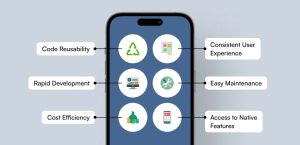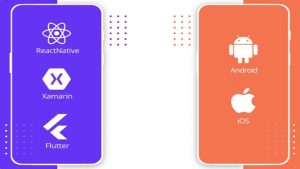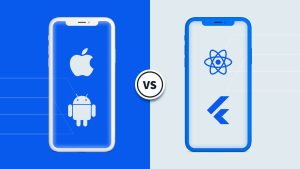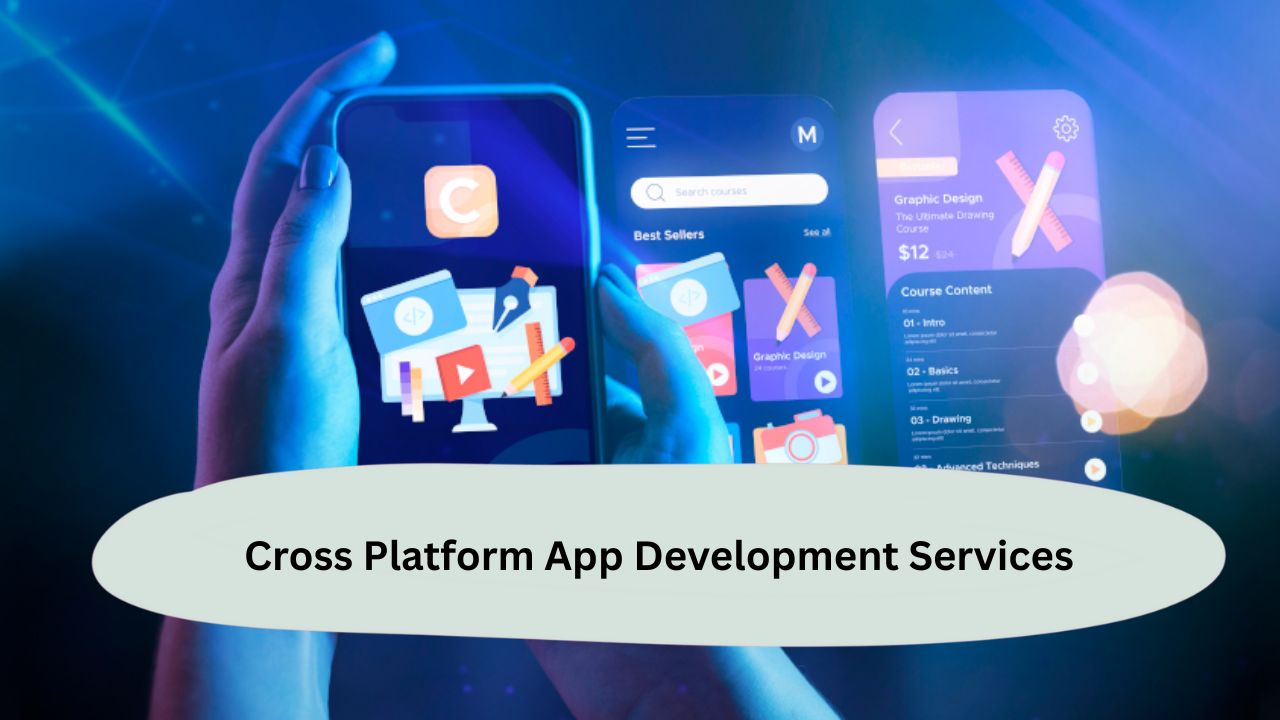By utilizing Cross Platform App Development Services , I was able to get my app on both iOS and Android platforms faster than if I had hired a separate team for each platform. It helped me save nearly 40% in development costs and enabled me to reach users on both platforms from day one.
Cross platform app development services enable businesses to develop applications for both iOS and Android from a single codebase, reducing development times and costs. It’s an efficient and scalable solution for companies that want to tap into wider audiences without building and deploying two separate apps.
Here, you will discover how Cross Platform App Development Services enable faster launches, wider reach, and smarter scaling – all from one codebase.
What is cross platform app development?
Cross-platform app development involves building applications that function on both iOS and Android using a single codebase. Cross-platform app development is often less costly, faster, and easier to update later on.
Developers will commonly build cross-platform apps with frameworks such as Flutter or React Native. Cross-platform is beneficial when the company wants to maximize its reach. But it may not perform as strongly as a native app.
Benefits of Cross Platform App Development Services

Faster Development Time
Speed is one of the biggest benefits of cross-platform app development services. With a single codebase, your development team will not have to build and test everything separately.
Here’s a simple explanation of how this speed is gained:
- Common Code Base: You are going to write once and deploy for all.
- Pre-built Components: When using a language like Flutter, you have pre-built widgets to utilize.
- Easy Update: You are now able to push changes and bug fixes quickly.
Picture this—you have an app to launch in less than 3 months and can use cross-platform to reach that goal.
Speed presents a significant advantage in a time-crunched situation, like:
- Startups that have hard deadlines
- Businesses needing to launch during an event season
- Businesses developing a marketing campaign that requires an app
Savings When Compared to Native App Development
Let’s be real, native app development can be expensive, especially if you are developing for both Android and iOS.
Cross-platform can save you a lot of money in a variety of ways:
- One Team vs. Two: You do not have to pay for expensive Android and iOS developers.
- Less Testing Time: You only have to learn and test one application.
- Design Only Once: You don’t have to redesign for the IOS platform.
A business can save on average 30–40% with cross-platform development compared to native.
For small and mid-size companies in the USA, that cost difference can mean the ability to launch or not.
Broader Audience Reach
Every business owner in America has one thing in common: they want more users.
By utilizing cross-platform app development services, your app can be launched on:
- Google Play Store (Android)
- Apple App Store (iOS)
- Web and Desktop (in some instances)
That’s a fantastic way to help users access your application, no matter where they are, without doing any extra work.
This is a fantastic option for businesses that:
- Broadly serve users across devices
- Have a single app strategy
- Want to be able to scale quickly
From a user experience perspective, they get access to your application regardless if they are on an iPhone in California or on an Android device in Texas!
Unified Codebase
Maintaining two varied builds can be a headache, which is where a unified codebase can shine!
The beneficial aspects are:
- Consistent Performance
- Easier Bug Fixing
- Faster Feature Rollouts!
For businesses, to achieve less downtime, generate fewer customer complaints, and ultimately create happier users.
Is Cross-Platform Development Worth It?
Cost Savings and Speed to Market
Cross-platform development eliminates separate codebases so you can save lots of time and money. It allows for quicker roll-outs and easier maintenance, and is great for startups with limited budgets.
Broader Reach
You can reach both iOS and Android users with one app. From day one, you’d be extending your reach and visibility to a larger audience. This results in quicker user growth and broader market coverage.
Consistent UI/UX
Cross-platform tools inherently promote the same interface and user experience across multiple devices. This increases user trust and makes navigation easier in your app.
Performance limits of Native
Apps that require high-performance graphics or device-specific features may not be able to use cross-platform frameworks. In demand use cases, native still wins.
Scalability and support
While cross-platform frameworks are great for initial growth, the time to scalability may expose the limitations of the framework. Native integrations developed can be incorporated in a straightforward manner. As it pertains to third-party apps, they may become more difficult to implement as time progresses.
What is the best cross-platform mobile development?

It depends on the project, but we say that Flutter and React Native are the best options. Flutter allows you to develop super quickly, has its own UI interface engine, and performs extremely well.
React Native uses JavaScript and has a strong network backing its support. Both options are highly recommended for quickly produced applications. Xamarin and Kotlin Multiplatform are two other strong options that also would perform well for certain projects.
Are Cross-Platform Apps Suitable for Gaming?
Cross platform mobile app development services provide a good option for creating casual or lightweight games. Cross-platform development is best for 2D games or strategy-based games that don’t need a heavy graphics or physics engine. For high-end games or graphics-intensive games such as first-person shooters or AR/VR-based games, native development is still recommended since it provides more complete access to hardware resources and the ability to control GPU-level optimization.
- Good for basic 2D and puzzle games
- Greatly decrease development time and costs.
- Limited performance in high-end gaming
- More appropriate for simple UI and animations
- Cross platform mobile app development services are not appropriate for graphics-intensive games.
What Are Cross-Platform Services?

Cloud-Based Backends
Cross-platform applications commonly utilize cloud services, such as Firebase, AWS, or Azure, to handle data, authentication, and storage. If you’re using cloud services, you will not need to duplicate any backend logic across both platforms, so the app will work as intended on every platform.
API Integrations
APIs allow your app to interact with outside services, like payment processing, mapping services, and social authentication. Cross-platform frameworks support either RESTful APIs or GraphQL, so API integration can be a universal solution across iOS and Android.
Push Notification Services
Tools like OneSignal and Firebase Cloud Messaging provide push notification services that let you send push notifications across every device, from a single dashboard, to keep your users engaged, as they can still receive alerts no matter which device they are using.
Analytics / Monitoring Tools
Cross-platform apps are utilizing analytics tools like Google Analytics, Mixpanel, or App Center to effectively monitor user behaviour, application performance, and crash information in a real-time manner — across both platforms.
Continuous Integration and Deployment (CI/CD)
CI/CD providers, such as Codemagic, Bitrise, or GitHub Actions, provide an opportunity to automate testing and deployment of your application and keep your cross-platform app up to date and almost bug-free with no more effort than configuring the CI/CD and hosting the code in an online service.
What industries benefit most from cross-platform app development services?
Industries such as e-commerce, healthcare, education, finance, and media get significant advantages from cross-platform app development. These industries want fast time-to-market on various platforms to get in front of as many users as possible, which is why cross-platform solutions are great because they allow them to save costs while keeping the user experience consistent. Cross-platform app development will also benefit startups and businesses with limited budgets.
Can Cross-Platform Apps Access Native Device Features Like GPS or Camera?

Yes, cross platform mobile app development services, indeed, allow access to native device features (such as GPS, camera, Bluetooth, or most native sensors) using frameworks like Flutter and React Native with their plugins and or native modules to facilitate the connection between the cross-platform code and native APIs.
- Access to GPS, camera, Bluetooth, sensor
- Use plug-ins and native modules for integration
- Reliable performance app with a supported framework
- Limitations for advanced hardware features
- Cross platform mobile app development services provide wide access to device capabilities
How Long Does It Take to Develop a Cross-Platform App?
Based on App Complexity
Development time will vary greatly depending on the complexity of the app itself. A basic app with basic features will take 2-3 months to develop, while a feature-rich app or enterprise-grade app will take 4-6 months or more. The more screens, custom designs, and functionality, the longer the development time.
Faster Than Native
In general, cross-platform apps can take 30-40% less time to build compared to building a native app for both iOS and Android, because there is one codebase to manage, and so much less duplication of work to do.
Time for Testing and Debugging
Even though the coding time has been reduced, there is still a significant amount of testing to ensure that the app works on all devices. Cross-platform apps must be tested on both Android and iOS to ensure bugs specific to the platform are caught. This can take several weeks, depending on the size of the app.
Post-Launch Updates And Maintenance
The initial development of the app is only the first stage of the process. Post-launch app updates, user feedback updates, and ongoing maintenance are also a part of development that add time to the overall process. Luckily, with cross-platform apps, updates are generally easier and faster to manage because there is only one place to change.
Can cross-platform apps support offline functionality?

Yes, cross-platform apps can support offline functionality with local storage, using a local storage system such as SQLite or Realm to save data on the device, with the ability to sync to servers when a connection is reestablished.
Offline functionality is useful for a wide range of apps, such as note-taking tools, task managers, field service tools, and any other place where people use apps without connectivity. This allows everything to work seamlessly for the user.
Will I Need Separate Maintenance for Android and iOS Versions?
One of the main advantages of cross platform mobile app development services is ease of maintenance. When there is only one codebase, when you need to update or fix a bug, you only have to do it once, across the two platforms, saving time, effort, and ensuring consistent features and performance for Android and iOS.
- A single codebase means unified maintenance
- Quicker bug fixes and updates
- Reduced long-term development costs
- Easier version control and release management
- Cross platform mobile app development services reduce post-launch maintenance headaches.
How Secure Are Cross-Platform Apps Compared to Native Apps?

Security Standards and Best Practices
Cross-platform applications can achieve comparable security to native applications when they possess the best practices inherent in well-written code. Development frameworks such as Flutter and React Native include support for encryption, secure storage, and authentication.
Access to Security Features Native Applications Have
Modern-day cross-platform development tools provide devices’ native security or biometrics, secure storage, and KeyChain device-level security techniques. Native applications may come with more integration, and cross-platform can equal the underlying security with plug-in and API benefits.
Third-Party Library Security Vulnerabilities
One of the challenges of cross-platform development is third-party libraries; these packages may not be fundamentally secure or even maintained. Developers need to be mindful of where they choose to get external packages from, and they must make themselves aware of the security patches and updates in order to mitigate exposure.
Risk Of Exposing Code
JavaScript and Dart are typically utilized for cross-platform applications and may be deceptively easy to decompile; the respective languages are easier to reverse engineer than other native applications. Developers can benefit from knowing that there are obfuscating, minifying programs, using native languages, and other benefits to avoid reverse engineering, depending on the case; however, native applications usually offer more robust code-level security than cross-platform applications.
FAQs: Cross Platform App Development Services
1. Can cross-platform apps work on both mobile and desktop?
Yes, frameworks like Flutter allow deployment across mobile, web, and desktop with the same codebase.
2. Do cross-platform apps offer real-time updates?
Yes, features like hot reload and unified codebases enable fast updates and bug fixes across platforms in real-time.
3. Which platform is better: Flutter or React Native?
Both Flutter and React Native are fantastic frameworks. Flutter, which is developed by Google, is easy to use and provides fast performance combined with beautiful UI widgets. React Native was introduced by Meta and is a great solution for teams that are already familiar with JavaScript.
4. How do cross-platform apps perform compared to native?
Modern cross-platform apps perform virtually indistinguishably from native apps when looking at the application’s features and user experiences. With tools and frameworks available today, most people cannot tell the difference! Unless your app requires unique device-specific features, you will be fine with cross-platform as a practical and scalable solution.
5. Are cross-platform apps secure?
Yes, cross-platform apps can be secure when developed properly. Security depends on how the app is coded, how data is handled, and what type of backend system is in place. Simpalm uses documented industry best practices to make sure your app is safe, encrypted, and compliant with privacy regulations (GDPR and CCPA).
Conclusion: Cross Platform App Development Services
Cross Platform App Development Services provide U.S. businesses with a faster, smarter, and more cost-effective method for creating mobile applications. With state-of-the-art tools such as Flutter and React Native, and expert partners like Simpalm, scaling on different platforms is simple. It’s the contemporary answer to growth, efficiency, and success.
Read more:



